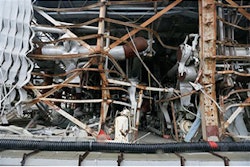The price of oil remained above $93 a barrel Wednesday amid expectations U.S. crude stockpiles fell last week for the first time in nearly two months in a possible sign of improving demand.
By early afternoon in Europe, benchmark U.S. crude for December delivery was down 4 cents at $93.30 a barrel in electronic trading on the New York Mercantile Exchange. On Tuesday, the expiring December contract rose 31 cents to close at $93.34.
The much more heavily traded January Nymex contract was up 4 cents at $93.93.
Investors are awaiting data on U.S. retail sales and weekly stockpiles of crude oil and refined products that will shed light on the strength of the economy.
Stockpile figures for the week ending Nov. 15 are expected to show declines of 500,000 barrels in crude oil stocks and 150,000 barrels in gasoline stocks, according to a survey of analysts by Platts, the energy information arm of McGraw-Hill Cos.
If confirmed, the fall in crude oil supplies would be the first in nearly two months and indicate a pick-up in demand.
Oil has traded between $93 and $96 a barrel this month and is down from nearly $110 a barrel in early October due to ample supplies and tepid demand.
There are, however, some jitters over the resumption of negotiations in Geneva on Wednesday about Iran's nuclear program. Six nations — the U.S., Britain, France, Russia, China and Germany — are offering a gradual rollback of sanctions that have crippled Iran's economy.
"If sanctions were to be eased, additional crude oil would become available from Iran — oil that is not really needed, in fact, given the plentiful supply," said analysts at Commerzbank in Frankfurt in a note to clients.
President Barack Obama deflated some of that speculation after he rejected reports that Iran would receive $40 billion or $50 billion in sanctions relief, and said any concession would be limited. He said new sanctions would be applied, if Iran refused to accept a deal or forsook its commitments under an agreement.
Reports that tankers at ports in Libya were loading oil helped ease crude prices in Europe, which is a major consumer of crude from the North African country struggling to achieve stability more than two years after the overthrow of dictator Moammar Gadhafi in 2011.
Brent crude for January delivery, the benchmark for an international variety of crude, was down 19 cents to $106.73 a barrel on the ICE Futures exchange in London.






















